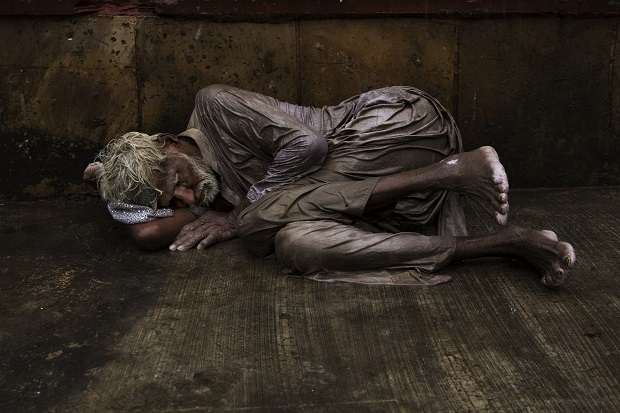
An Indian homeless man tries to sleep on a wet street during monsoon rains in New Delhi, India, Saturday, July 11, 2015. Tens of thousands of impoverished people live on the streets in New Delhi, where they struggle with constant hunger and extreme weather while sleeping nights next to busy intersections and roads. Some make camp in crowded alleyways, in abandoned lots or by garbage dumps. Many come from countryside villages in hopes of finding better economic opportunities in the Indian capital. AP
UNITED NATIONS, United States — The 193 member states of the United Nations have reached agreement on a new development agenda for the next 15 years that calls for eradicating poverty and hunger, achieving gender equality, improving living standards and taking urgent action to combat climate change.
The draft agreement reached Sunday evening outlines 17 goals with 169 specific targets on issues ranging from ending poverty “in all its forms everywhere” to ensuring quality education and affordable and reliable energy, and protecting the environment.
“We can be the first generation that ends global poverty, and the last generation to prevent the worst impacts of global warming before it is too late,” Secretary-General Ban Ki-moon told reporters Monday.
The document — called “Transforming our World: The 2030 Agenda for Sustainable Development” — will be adopted at a U.N. summit just before the annual meeting of world leaders at the General Assembly in late September. More than 160 world leaders are on the provisional speakers list for the three-day summit starting Sept. 25 which was released Monday including the presidents of China, Russia, Iran and France.
Ban said “the goals represent a ‘to-do’ list for people and the planet.”
“They address the requirements for all humanity to be able to live decent lives free from poverty, hunger and inequality,” he said. “They commit all of us to be responsible global citizens, caring for the less fortunate as well as for our planet’s ecosystems and climate action on which all life depends.”
The 17 new, non-binding goals will succeed the eight Millennium Development Goals (MDG) adopted by world leaders 15 years ago.
Elaine Geyer-Allely, who monitored the U.N. negotiations for WWF, the world’s largest independent conservation organization, said the new plan is a significant improvement because it recognizes that protecting the environment, eradicating poverty and promoting economic growth and well-being are interlinked.
Amina Mohammed, the U.N. special advisor on the post-2015 agenda, said more than 8,000 people engaged in setting the new goals, including for the first time representatives from hundreds of organizations, business, parliaments and youth in addition to government officials.
In his final report last month on the Millennium Development Goals, Ban said the effort has helped lift more than one billion people out of extreme poverty over the last 15 years, enabled more girls to go to school than ever before, and brought unprecedented results in fighting diseases such as HIV/AIDS.
Despite significant progress on all the MDGs, the only original goal that was achieved ahead of time was cutting in half the number of people living in extreme poverty, and that was due primarily to economic growth in China.
Ban stressed inequality remains, with 80 percent of the people living on less than $1.25 a day located in southern Asia and sub-Saharan Africa, and 60 percent in just five countries, India, Nigeria, China, Bangladesh and Congo.
Agreement on the new goals is the culmination of more than three years of intense and complex negotiations.
Sticking points in the negotiations, which were supposed to be completed Friday, included differences over references to good governance, reproductive rights for women and occupied territories — and on how to refer to climate change ahead of the December summit in Paris which will hopefully adopt a legally binding climate agreement to keep global warming from reaching dangerous levels.
Two key issues are cost and implementation.
Kenya’s U.N. Ambassador Macharia Kamau, one of the facilitators of the negotiations, said implementing the goals will cost between $3.5 trillion and $5 trillion every year, which he insisted is “not unattainable” because most money will come from domestic resources raised in countries, complemented by international development assistance.
“There is no reason why we can’t see remarkable transformation,” he said.
Ireland’s U.N. Ambassador David Donoghue, the other facilitator, said that even though the goals are political “don’t underestimate the impact on governments” which will be subject to peer pressure and regular monitoring on implementation.
“They do represent a new way of doing business,” he said. “It is highly significant.”